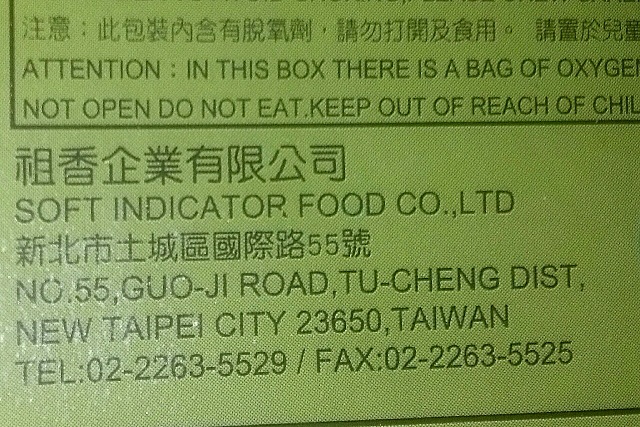Soft indicator
« previous post | next post »
An anonymous correspondent sent in this photograph of a food package from New Taipei City, Taiwan:
Since the photograph is cropped on the right side, part of the notice has been cut off, but enough remains to make a few pertinent remarks.
First of all, despite what the English notice might have said, there was not a "bag of oxygen…" in the box, but rather a packet of tuōyǎngjì 脫氧劑 ("deoxidizer").
Boxes of certain foods and other products from Taiwan also often come with packets of gānzàojì 干燥剂 ("desiccant"), usually silica gel, in them.
The quirkiest part of the label, though, is the English name of the company: SOFT INDICATOR FOOD CO., LTD. I'm not sure what "soft indicator" means here, but the company does make soft desserts like Japanese mochi (in fact, I suspect that some such sweet might have been in this package). The intelligence community also seems to be fond of the term "soft indicator". See, for example, Jan Goldman's Words of Intelligence: An Intelligence Professional's Lexicon for Domestic and Foreign Threats, 2nd ed. (Lanham, Maryland: Scarecrow, 2011), p. 147, where it is defined thus: "A generalized, theoretical action that focuses on capabilities and may be linked to possible intentions of an aggressor." (Naturally, this contrasts with "hard indicator", and you can guess what sort of thing that might be.) But this type of "soft indicator" is hardly what the company had in mind when they chose this term for their name.
"Soft indicator" is also a technical term in ultrasound diagnosis for Down syndrome, and it may refer to a device on Oral-B toothbrushes, scales, and other medical appliances. Since many of these are manufactured in Taiwan and China, perhaps this is how the Taipei food producer heard about the term. In any event, inasmuch as the mochi produced by the company are indeed extraordinarily SOFT, the name was probably chosen with this quality in mind.
If you were hoping that the Chinese name of the company might help to elucidate the full meaning of "soft indicator", you will be disappointed. It is Zǔxiāng qǐyè yǒuxiàn gōngsī 祖香企業有限公司 ("Ancestral Incense Enterprises Ltd.").

Mark Mandel said,
February 4, 2014 @ 1:47 am
Oy, and also vey.
(Also, you've tripped over a very common misspelling trap: /'dɛsɪkənt/ is spelled ‹desiccant›, with a double consonant after the unstressed vowel, not the stressed one.)
[VHM: Thanks. I don't know how that happened. Either I was half asleep or I copied it from some source that had it that way. Because I deal with desiccated corpses (i.e., the Tarim mummies) all the time, I know the correct spelling very well.]
X said,
February 4, 2014 @ 2:48 am
What's the deal with New Taipei City? Is there really anybody who's not calling it Xinbei?
According to my most diligent googling, there was some pushback from people who thought it should be Sinbei, which yielded the atrocious compromise "New Taipei City". Are people really saying this or is it just a government-pushed fantasy?
Stephan Stiller said,
February 4, 2014 @ 7:55 am
@X
"New Taipei City" sounds a bit like "Neo Tokyo", the post-apocalyptic version of Tokyo that (as an enthusiast friend tells me) serves as the setting for many sci-fi anime films: http://en.wikipedia.org/wiki/Neo_Tokyo
Mark S. said,
February 4, 2014 @ 10:29 am
Re. "What's the deal with New Taipei City?"
My main post on it is here: X marks the spot. The comments carry on for an additional page. (Again, I must apologize for the encoding problem that results in FUBAR diacritics and hanzi.)
That post was written before the official announcement.
I believe the real reason “New Taipei City” went through in the end is only incidentally related to the romanization scuffles in Taiwan and has little to nothing to do with the needs of foreigners, though they are the ostensible use group. Rather, the name was approved because Taiwanese can understand the English words in it and thus find it pleasing. “Hey, we know English! We’re international!”
Victor Mair said,
February 4, 2014 @ 10:42 am
For those who live in Banqiao, the creation of New Taipei has been somewhat unsettling. It used to be a city (called Panchiao) by itself and was the former seat of Taipei County. Now it has become a district which is the city seat of New Taipei.
http://en.wikipedia.org/wiki/Banqiao_District
I think that I got that right.
X said,
February 4, 2014 @ 12:26 pm
My brother-in-law lives in Banqiao, so I visit every now and then. I always thought it was an outlying district of Taipei. It's right there on the subway and everything. It's definitely bizarre that the "city" limits of Xinbei go up into the mountains and little tea-growing villages.
In conclusion, New Taipei City is neither new, Taipei nor a city. Discuss!
Rubrick said,
February 4, 2014 @ 5:11 pm
@VHM: "Because I deal with desiccated corpses (i.e., the Tarim mummies) all the time…."
I think linguists may do an inadequate job of publicizing the awesomeness of their profession….
John Swindle said,
February 5, 2014 @ 8:26 pm
The more common term is "soft sign." They serve East Slavic cuisine.